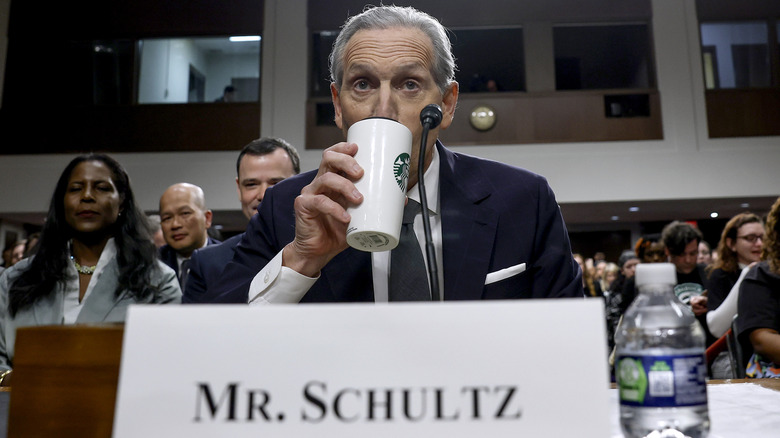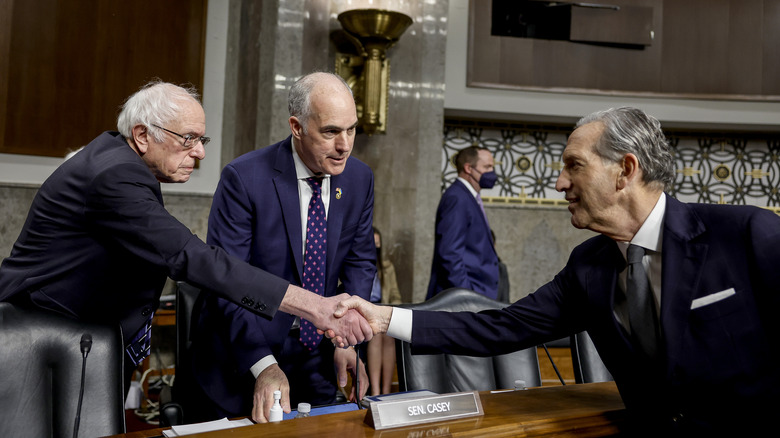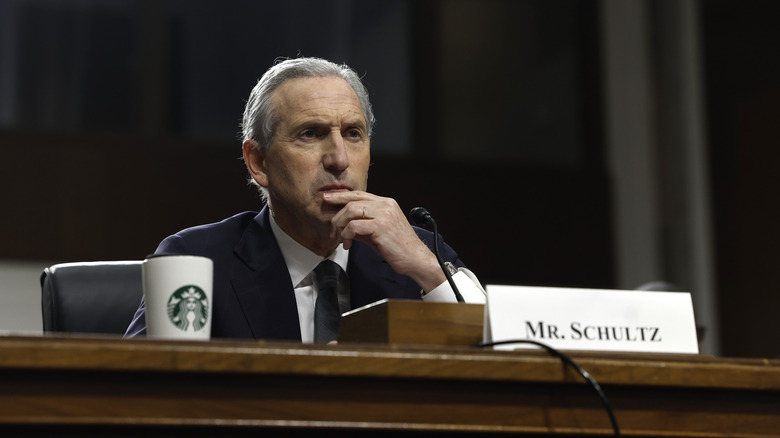Howard Schultz Appears At Senate: Starbucks 'Has Not Broken The Law'
The long and eventful Starbucks unionization saga hit a milestone today as billionaire, former Starbucks CEO, and outspoken union opponent Howard Schultz appeared before the Senate's Health, Education, Labor, and Pensions committee, chaired by longtime labor advocate Senator Bernie Sanders.
It was as much a face-off of Starbucks vs. federal labor laws as it was a symbolic showdown between assembling workers and corporate figureheads on a national stage. Since December 2021, corporate Starbucks has drastically cut hours for vocal pro-union employees, refused to meet with union reps, closed stores in the middle of their union elections, and offered benefits exclusive to non-union employees — behavior for which Sanders challenged Schultz to testify before the Senate in February. Schultz refused Sanders' initial request and only appeared today under the threat of subpoena.
Much like Starbucks' record of unfruitful meetings with union reps, the hearing was a spectacle but less than productive. As Sharon Block of the National Labor Relations Board (NLRB) noted to the committee, the fact that the hearing happened at all was a major win for the voice of trade workers' rights in America. And the chairman, Senator Sanders' opening statement noted that the NLRB has filed over 80 complaints against Starbucks for violating federal labor law and over 500 charges of illegal union-busting tactics.
The bulk of the hearing consisted of various Senators and representatives point-blank presenting Schultz with incident after incident of the company's unlawful labor practices, Schultz repeatedly insisted that Starbucks has not broken the law.
Schultz's testimony a broken record
Throughout the three-hour-long hearing (you can stream the whole thing on the Senate's website), Schultz essentially reiterated his previously stated position that Starbucks simply prefers not to have unions. In a February 2023 interview with CNN, Schultz told the outlet that he feels labor unions contradict Starbucks' vision, saying, "I don't think a union has a place in Starbucks. If a de minimis group of people... file for a petition to be unionized, they have a right to do so. But we as a company have a right also to say, 'we have a different vision that is better.'"
In many ways, the Starbucks unionization struggle has been a war of technicalities. So far, according to union employees, negotiations are getting stalled by minute details. Starbucks' lawyers want to negotiate terms on a store-by-store basis, while the Starbucks Worker's Union (SBWU) argues that it makes more sense to talk about the union body as a whole, reports the Washington Post. A common phrase in many of Starbucks spokesperson Andrew Trull's previous public statements is "as required by law" or "as legally obligated," making it quite plain that Starbucks is more interested in fending off the public eye (and subsequent legal action) than actually meeting its "partners" at the bargaining table.
A momentous hearing, but will it bring about change?
Sanders' opening statement cited the chilling statistic that more than 60% of Americans today are living from paycheck to paycheck while the top 1% owns more than the combined wealth of the bottom 90%. "As a result of that economic reality," said Sanders, "what we are now seeing is a major increase in trade union organizing."
If the SBWU proves successful, the ripple effect of a Starbucks union contract would be enormous. That contract would serve as a symbol for struggling low-wage employees across the U.S. to unite and demand better working conditions. California fast food employees have been locked in a comporable stalemate while trying to push for a $24 minimum wage. In November, New York City's Department of Consumer and Worker Protection proposed raising the minimum wage for third-party delivery drivers like Doordash to $24/hour.
However, for now, any concrete progress in the Starbucks push remains to be seen. So far, Schultz has canceled many of the 85 scheduled meetings he agreed to with labor union reps and has been convicted of over 20 recorded unlawful terminations of union employees. At the end of the hearing, Sanders requested that Schultz negotiate a contract with labor union reps within 14 days after the hearing — a request Schultz denied.


